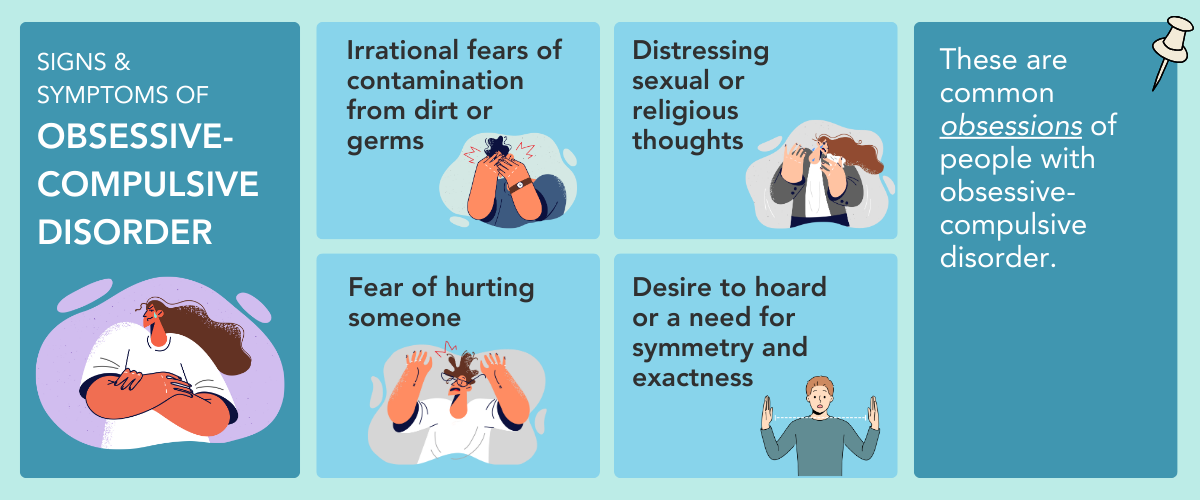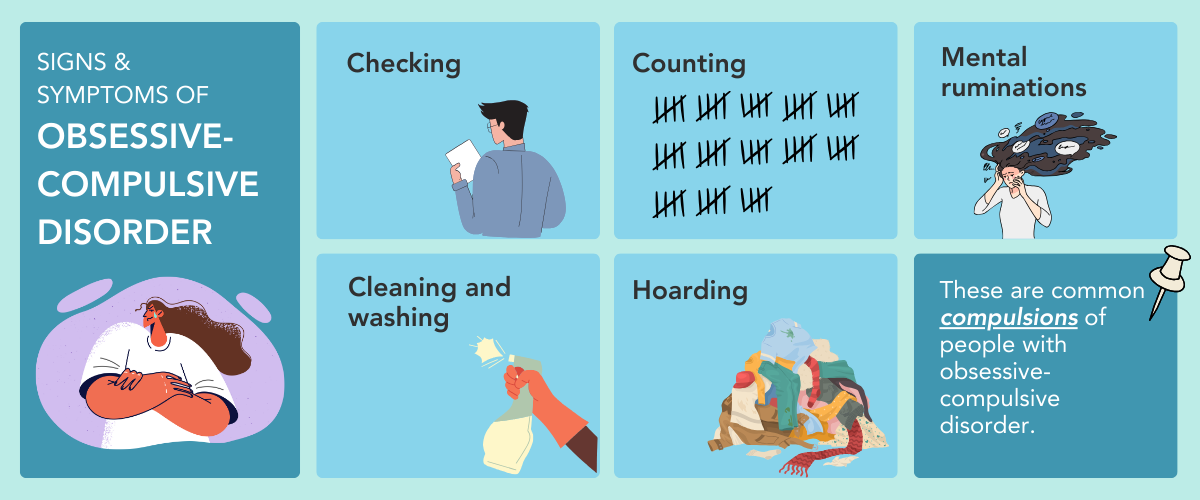Common obsessions in OCD include:

- Irrational fear of contamination from dirt or germs
- Distressing sexual or religious thoughts
- Fear of hurting someone
- Desire to hoard or need for exactness and symmetry
Common compulsions include:

- Checking
- Counting
- Cleaning and washing
- Hoarding
- Ruminating
Obsessive compulsive symptoms are also found in people diagnosed with other psychiatric and neurological disorders, such as Tourette’s syndrome, Autistic Spectrum Disorder, epilepsy, head trauma and front ear lobe lesions.
These signs and symptoms are distressing, time consuming and significantly interfere with a person’s normal routine, work, or social activities and relationships.
People with OCD may have co-morbid depression where they worry incessantly, often overwhelmed by repetitive negative thoughts. Both psychological and biological factors have been found to play a role in causing OCD.
Hoarding behaviours as a result of OCD
About 30% of people with OCD experience hoarding challenges. Hoarding can sometimes be due to other mental health conditions such as psychosis where a person feels compelled to behave a certain way.
A person with Hoarding Disorder:
- Has great difficulty discarding or parting with possessions, regardless of their actual value
- Experiences distress when discarding the items due to the perceived need to save the items
- Accumulates items until they congest and clutter living areas
- Shows significant social and occupational impairment, a lack of self-care and increasingly unable to cope with daily living which inevitably affects self and others
In children, OCD symptoms easily go undetected, resulting in delayed treatment. Children also find it difficult to articulate their thoughts and may also be secretive or feel ashamed of their behaviour. It is important to involve family members in the managing OCD in their loved ones, to help them understand the symptoms so that they may offer support to the affected person.
If you know of a child struggling with symptoms of OCD, speak to the child’s school counsellor or make an appointment with the Child Guidance Clinic at Tel: 6389 2200.
If you know someone who may have a hoarding problem, you can approach the Housing and Development Board (HDB) for assistance. Alternatively, you can call the Mental Health Helpline at 6389 2222 for advice if you know the person in need may have mental health issues.
Types of Treatment
OCD can be successfully treated and evidence shows that the sooner it is detected, the better the treatment outcomes are likely to be.
A combination of medication and behavioural therapy has been found to be effective in significantly reducing the symptoms of OCD.
- Medication
Medication may be prescribed before or during behaviour therapy if there is indication of severe depression. Drug treatment after behaviour therapy may be prescribed if the therapy has been only moderately effective despite good cooperation. The use of antidepressants has proven to be effective in the treatment of OCD. - Cognitive Behavioural Therapy (CBT)
The mainstay of psychological treatment is CBT, where the individual is deliberately exposed to obsessional cues, and then prevented from engaging in the associated repetitive behaviour. With repeated and prolonged exposure to triggers, habituation eventually takes place. Exposure tasks are arranged hierarchically, with treatment commencing with the least anxiety-provoking situation and progressing rapidly through the hierarchy. Ruminations are more difficult to treat. Aversion conditioning such as thought-stopping may be helpful. In addition, it is also useful to teach the individual ways of coping with the anxiety, anger and stress. He will be encouraged to set other targets in life so as to develop a healthier lifestyle.
The combination of CBT and medication increases treatment efficacy. It is important to involve the family in the management of individuals with OCD. Family members are often ignorant about the disorder and may be drawn into the patient’s rituals.
To make an appointment to see a doctor, please call 6389 2200.
